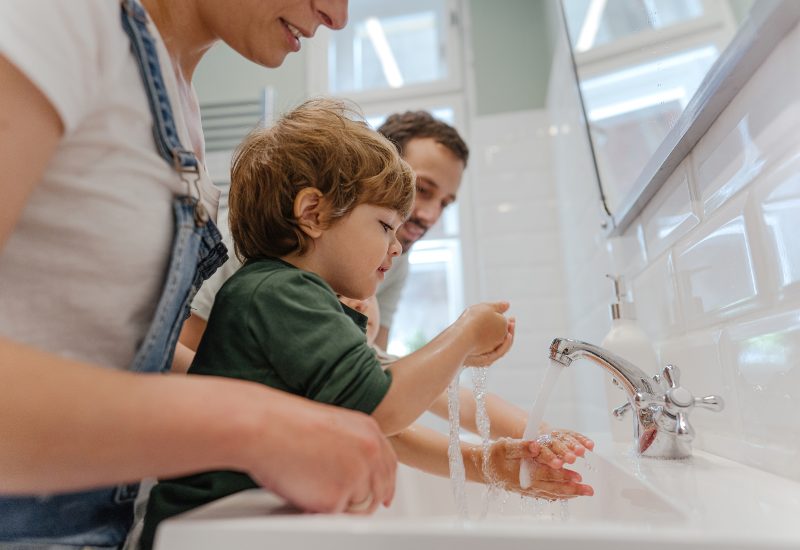
Plumbing emergencies can happen to anyone, including on the weekend or in the middle of the night. Whether you find a puddle on the bathroom floor, can’t get the water to turn hot, or have a sink that won’t drain, odds are you need an emergency plumber. Before you pick up the phone, get the situation under control by following these tips.
Turn Off the Water
If the plumbing emergency involves a leak, overflowing toilet, or outright flood, shut off the water supply to minimize property damage. In the case of individual fixtures flooding or leaking, you should find a shut-off valve on the wall behind the fixture in question. This is the fastest, easiest way to stop the flow of water.
If you don’t know the source of the leak or can’t find the local valve, look for the main water shut-off valve that controls the water flow to the entire house. Depending on your home’s plumbing configuration, this may be located near the water meter, by the water heater, or in a metal box buried close to your property line.
Determine the Urgency of the Situation
When your plumbing acts up at 4:00 in the morning, you have a decision to make—do you call an emergency plumber immediately, or do you wait for regular business hours? The primary reason to postpone your call is to avoid paying an overtime charge. However, an urgent situation may warrant calling without delay.
For instance, you may not need a plumber right away, even if your toilet is severely clogged, provided you turn off the water and have another toilet in the house. Even a leaky faucet or water supply hose can wait if you’re able to stop the flow of water by turning the local shut-off valve.
However, a burst pipe requiring you to shut off the water to the whole house in order to prevent property damage requires immediate attention. This is also true of a severe sewer backup that prevents you from using any of your drains, as well as a broken water heater that leaves you with nothing but cold water at the tap.
Try Clearing Clogged Drains Yourself
If the emergency involves one or more clogged drains, you can attempt to clear the blockage yourself before calling an emergency plumber. Here’s how:
- Plunger: One option is to use a plunger. For a clogged sink, shower, or bathtub drain, you’ll need a standard cup plunger. If your toilet is clogged, reach for a flange plunger, which has an additional rubber piece that helps it fit inside the toilet bowl more snugly.
- Drain auger: Another drain cleaning method is to use a hand crank or drill-operated auger, also known as a plumbing snake. If you already have one on hand, great! If not, you can get one from your local hardware store.
Plumbers don’t recommend using drain-cleaning chemicals to clear stopped-up drains. This DIY solution may temporarily relieve slow drains, but the clog will return before long. Using one of the chemical-free methods described above is far better to prevent exposing your pipes and local drinking water supply to harsh substances. If a plunger or drain auger doesn’t work, then you can request emergency drain cleaning.
Diagnose the Cause of No Water Flow
When water stops flowing, the issue is usually localized to a single plumbing fixture. This may be due to a frozen pipe or other problems with the supply line. Check other water outlets around the house to see what else is affected. Be sure to check both hot and cold water supplies. Often, a water heater problem will cause the hot water to stop working while the cold side remains operable.
If your hot and cold water taps are not working throughout the entire house, it could mean a buried water pipe has been crushed or burst. This diverts the water supply from your home and may lead to low or no water pressure from your fixtures.
However, it’s more likely that your water company is to blame. Before you panic, reach out to discover if the lack of water flow is due to a larger problem on their end. Also, consider that the water company may shut off this utility if you fail to pay your water bill.
Call an Emergency Plumber
If you decide your situation warrants calling an emergency plumber, here’s what to do:
- Call several plumbers: You may need help right away, but plumbers charge very different rates for emergency services. Some charge double or triple their usual hourly rate to serve you on a holiday or weekend, while others have no overtime fees at all. Therefore, it pays to spend a few minutes calling around to secure the best price.
- Provide specific details: The more information you can offer over the phone, the better idea the plumber will have about your situation, what to bring to your house, and how much the repair might cost.
- Ask for a repair estimate: Any estimate you receive over the phone may not have pinpoint accuracy, but at least get a ballpark figure so you know what to expect.
- Ask to speak to the plumber: If you reach an after-hours answering service, request to speak to the on-duty plumber about your situation. This is the best way to get an accurate estimate and ensure the plumber arrives well-equipped to handle the emergency.
Affordable Emergency Plumbing in Puget Sound
When a plumbing emergency just can’t wait, turn to Puget Sound Plumbing and Heating for help. We offer 24/7 emergency plumbing services for homeowners throughout the Seattle area. Our experienced, highly trained plumbers are standing by to help any time of day or night, weekend or holiday. Best of all, we don’t charge extra for nights, weekends, or holiday visits. So feel free to call us anytime at (206) 938-3219 or contact us online to request the plumbing services you need!


